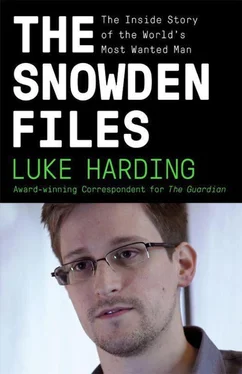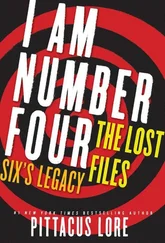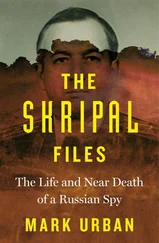The police pointed out the problem. MI5 redrafted the PCS form. Twice. In its final version MI5 claimed: ‘Intelligence indicates that MIRANDA is likely to be involved in espionage activity which has the potential to act against the interests of UK national security… We assess that MIRANDA is knowingly carrying material, the release of which would endanger people’s lives. Additionally the disclosure, or threat of the disclosure, is designed to influence a government, and is made for the purpose of promoting a political or ideological cause. This therefore falls within the definition of terrorism and as such we request that the subject is examined under schedule 7.’
It was an absurd account. It was written to mimic the wording of the language in the act defining ‘terrorism’. But of course, the authors knew it was not Miranda’s intention to make threats to endanger anyone’s life, least of all to achieve some ‘ideological objective’. The definition in the act was supposedly aimed at a fanatic who threatened to blow up a plane.
MI5 explained their anxiety: ‘Please do not make any reference to espionage activity. It is vital that MIRANDA is not aware of the reason for this ports stop. We would be grateful if this stop could be made to seem as routine as possible, and that it appears that this stop is not at the request of the Security Service.’
The use of schedule 7 against someone who was known not to be a terrorist was a blatant abuse – and an alarming precedent in which a government matched journalism with terrorism. This was the first time the much-criticised section of the act had been used against a journalist carrying source material. Coming on top of the forced destruction of the Guardian ’s computer on 20 July, it looked like a chilling attack on press freedom.
During its dealings with the Guardian over the summer, Downing Street had never once suggested that the newspaper was engaged in terrorism. ‘If there had been a real risk of a terrorism-related offence, one would have expected a prompt application for an injunction,’ Rusbridger says. Under the UK’s 1984 Police and Criminal Evidence Act, journalistic material enjoys protection. MI5 should have got a judge to approve Miranda’s detention. Instead it circumvented court procedures by using anti-terror laws.
Miranda was eventually released without charge at 5pm, and encouraged to board a flight – minus his stuff – back to Rio. His lawyer only managed to see him an hour before the nine hours were up. (Only one in 2,000 people stopped under schedule 7 are held for more than six hours. He was one of them.) News of his detention set off an international firestorm. The Brazilian government expressed ‘grave concern’. It said the use of schedule 7 in this case was ‘without justification’.
Back in Rio, Greenwald met an exhausted Miranda at the airport, with cameras looking on. Greenwald characterised his partner’s ordeal as a ‘failed attempt at intimidation… This is obviously a rather profound escalation of their [the US and UK’s] attacks on the newsgathering process and journalism,’ he wrote. He added emotionally, in terms that were perhaps somewhat over the top: ‘Even the mafia had ethical rules against targeting the family members of people they feel threatened by.’
The allegation that Greenwald and co were pushing a ‘political or ideological cause’, in much the same way as al-Qaida, caused civil liberties campaigners to express outrage. If true, this was an alarming threat to democracy, the group Liberty said. In Brussels there was astonishment. The Council of Europe, which polices human rights, wrote to home secretary Theresa May. It asked May to explain how Miranda’s treatment was compatible with article 10 of the European convention on human rights, guaranteeing freedom of expression.
A telling commentary came from Lord Falconer, the Labour minister who had helped introduce the Terrorism Act. ‘The state has exceeded its powers in this case,’ he said. ‘I am very clear that this does not apply, either on its terms or in its spirit, to Mr Miranda.’
May, however, was unapologetic. So was Oliver Robbins, the deputy national security adviser who had forced the Guardian to bash up its own laptops. Lawyers acting for Miranda challenged his detention in the High Court. In a blistering affidavit, Robbins said the Snowden disclosures had hurt national security. He offered no proof but accused Greenwald of ‘very poor information security practice’.
This was ironic: it was the British agency GCHQ that had lost control of sensitive information, not the Guardian . Robbins made no mention of the UK’s dysfunctional intelligence-sharing deal with the NSA, which apparently meant thousands of American officials – and passing private contractors – could read top-secret GCHQ files.
Two days after police scooped up Miranda, Rusbridger reacted by telling the story for the first time of what had happened in the Guardian ’s basement – the hot, messy work of pulverising hard drives. The paper’s Simon Jenkins described the episode as the ‘most bizarre act of state censorship of the internet age’; the two GCHQ boffins who supervised the destruction were ‘like so many book burners sent by the Spanish inquisition’.
Wherever he went the Guardian editor carried a small piece of destroyed computer in his inside pocket, rather as a medieval pilgrim would cherish a saint’s bone. ‘It’s a sort of artefact, a symbol of the role of the state versus the journalist,’ he says.
Rusbridger’s revelations and the absurdity of the Miranda affair had had a galvanic effect on British politicians. It was as if a jolt of electricity at last stirred a body that had previously been in a state of comfortable slumber. Since the Guardian published its first NSA article on 5 June, the story had ignited a debate across the world. In Germany, there was uproar; in the US, Congress was reviewing oversight; in Britain… torpor. Most MPs and newspapers ignored it. A handful of Conservatives batted the news away with the phrase ‘spies spy’. Downing Street said: nothing to see here.
Why this silence? There was one immediate explanation. When the Snowden revelations began, the secretary of Britain’s unique DA notice organisation, retired Air Vice-Marshal Andrew Vallance, secretly circulated a letter among the BBC and the newspapers, on 7 June 2013, reminding them to be mindful of national security issues. He was issuing the notice on GCHQ’s behalf.
His ‘Private and Confidential’ letter said: ‘There have been a number of articles recently in connection with some of the ways in which the UK intelligence services obtain information from foreign sources… The intelligence services are concerned that further developments of this same theme may begin to jeopardise both national security and possibly UK personnel.’
The DA notices, a rusty hangover from the cold war, are supposed to be voluntary advice; and they are supposed to protect patriotic media organisations from inadvertently publishing sensitive military information. In practice, the notices, with their hint of menace should they be defied, serve as a good way of closing down, or at least dampening, public debate. Those media who reported the Snowden disclosures at all, therefore, initially did so in a subdued fashion, particularly the state-funded BBC. The DA notice kept down the British public temperature.
There were further, cultural, reasons. Britain did not endure the same 20th-century totalitarian nightmare as Germany, or Nazi- or Soviet-occupied countries. The British took freedoms for granted. There hadn’t been a revolution since 1688, and that bloodless one didn’t really count. Moreover, spies in British popular culture were always the good guys: James Bond in the racy fantasies of Ian Fleming, or the dedicated professionals from the BBC TV drama Spooks .
Читать дальше












